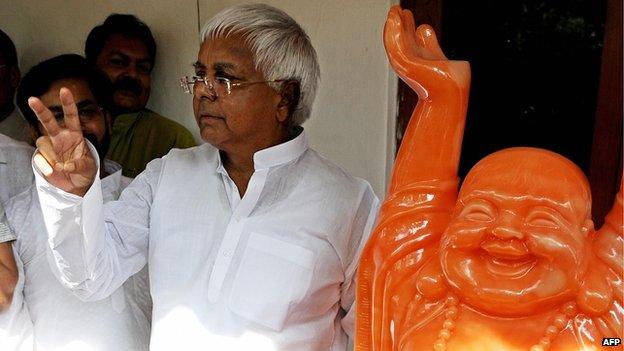Profile: Laloo Prasad Yadav
- Published

Laloo Prasad Yadav has lost much of his political base in recent years
Former Indian railways minister Laloo Prasad Yadav, who has been convicted in a long-running corruption case known as the "fodder scam", is one of the country's most colourful politicians.
Known for his quirky style and mass appeal, in his prime, there were few leaders in India who could rival his charisma and popularity.
Although he is an MP and remains a key ally of India's governing Congress party, Yadav, 65, has lost much of his political base in the last few years.
Once a formidable force in India's most lawless state, Bihar, which his Rashtriya Janata Dal governed for 13 years until electoral defeat in 2005, Yadav and his party have now been reduced to a poor minority.
Born in a poor farming family in Bihar, Yadav has travelled a long way from his humble origins.
As the federal railways minister, he was given credit for single-handedly turning the railways from an ailing, loss-making venture into one that makes profit.
He even found his way into the textbooks - a prestigious Indian management institute introduced a case study on his work in the ministry for its business students.
As he continued to fascinate popular imagination in Bihar and in other parts of India, he inspired many Bollywood characters and Laloo dolls, which became hugely popular with children.
'Fodder scam'
His problems began in 1996 when the police unearthed a big corruption scandal in which he and the state's leading bureaucrats and politicians were alleged to be involved.
The scandal involved embezzlement of 9.5bn rupees ($151m; £94m) meant for buying cattle fodder in Bihar and the media promptly dubbed it the "fodder scam".
The case shocked the country, chiefly because Yadav, whose politics is based on mass mobilisation of the lower-caste Hindu votes, had come to be known as a champion of social justice.
The scam forced him to resign as chief minister but he managed to install his wife, Rabri Devi, as his successor.
Illiterate and a newcomer to politics, Rabri Devi was nick-named "Rubbery Devi" by her critics who alleged that she was a rubber stamp for her husband and a mere figurehead. They said Yadav ran the state by remote control.
As a politician, Yadav was groomed by socialist leader Jai Prakash Narayan, who led a student movement in the early 1970s.
He formed the Rashtriya Janata Dal in 1997, after breaking away from the Janata Dal.